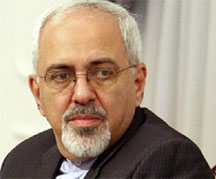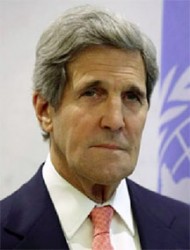VIENNA/WASHINGTON (Reuters) – The day before the Obama administration was due to slap new sanctions on Iran late last month, Iranian Foreign Minister Javad Zarif warned US Secretary of State John Kerry the move could derail a prisoner deal the two sides had been negotiating in secret for months.

Kerry and other top aides to President Barack Obama, who was vacationing in Hawaii, convened a series of conference calls and concluded they could not risk losing the chance to free Americans held by Tehran.
At the last minute, the Obama administration officials decided to delay a package of limited and targeted sanctions intended to penalize Iran for recent test-firings of a ballistic missile capable of delivering a nuclear warhead.
This account of previously unreported internal deliberations was provided by two people with knowledge of the matter.
A third official said Obama had approved the decision to delay the sanctions.
Those unilateral US sanctions are expected to be imposed quickly now after Iran freed five Americans, including Washington Post journalist Jason Rezaian, yesterday. Eight Iranians accused in the United States of sanctions violations were having charges dropped or sentences commuted yesterday under the complex prisoner deal, according to court filings and sources familiar with the cases.

The moves came as broader US and international sanctions were set to be lifted after verification that it had met commitments to curb its nuclear programme.
But Kerry’s decision not to call Iran’s bluff in December shows how months of clandestine negotiations to free Rezaian and other Americans became deeply intertwined with the final push to implement the nuclear deal, despite the official US line that those efforts were separate.
A US official said yesterday there was no connection between the nuclear deal and the release of the Americans.
The prisoner swap could also come under scrutiny from critics who have questioned the Obama administration’s resolve in dealing with Iran and ability to follow through on its pledge to keep a hard line on sanctions outside those imposed on its nuclear programme.
The episode was one of several diplomatic and military near misses between Iran and the United States in recent weeks, including a quickly defused crisis when 10 US sailors were detained after entering Iranian waters.
Details of the prisoner talks were a closely held secret, so even within the Obama administration few people realized how perilously close the swap came to falling through.
On Dec 29, Kerry told Zarif the United States intended to impose new sanctions on Iran over the missile test firings, which were deemed to have violated a United Nations ban, according to a US official and congressional sources.
Zarif countered that if Washington went ahead, the prisoner swap was off, the sources said.
Kerry spoke by phone that night with Treasury Secretary Jack Lew and a White House official and the decision was made to hold off on any sanctions announcement, they said.
Zarif’s ability to fend off new US sanctions, even temporarily, may have bought him some breathing space with Iranian hardliners who oppose the terms of nuclear deal. They have insisted that any new sanctions would be a show of bad faith by Washington.
But a bureaucratic misstep almost undid Kerry and Lew’s decision. Word of their last-minute intervention to delay the sanctions never filtered down to working-level officials at the State Department during the holiday lull.
Unaware of the change of plan, the State officials went ahead and quietly informed key congressional offices the next morning about the new Iran sanctions targeting about a dozen companies and individuals. They included copies of a news release that the Treasury Department intended to issue.
Officials then abruptly pulled back, telling congressional staffers the announcement had been “delayed for a few hours,” according to an email seen by Reuters. The next day the State Department emailed that sanctions were delayed because of “evolving diplomatic work that is consistent with our national security interests.”
Administration officials then told some congressional staffers confidentially that something big involving Iran was in the works, in an apparent attempt to tamp down criticism from Capitol Hill, a congressional source said.
Leading lawmakers, including some of Obama’s fellow Democrats, chided the White House for delaying the sanctions package and suggested it could embolden Iran to further threaten its neighbors and destabilize the Middle East.
